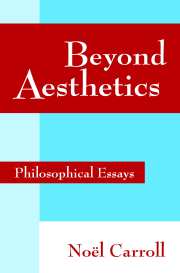Book contents
- Frontmatter
- Contents
- Foreword by Peter Kivy
- Introduction
- PART I BEYOND AESTHETICS
- PART II ART, HISTORY, AND NARRATIVE
- PART III INTERPRETATION AND INTENTION
- PART IV ART, EMOTION, AND MORTALITY
- PART V ALTERNATIVE TOPICS
- On Jokes
- The Paradox of Junk Fiction
- Visual Metaphor
- On Being Moved by Nature: Between Religion and Natural History
- Emotion, Appreciation, and Nature
- Notes
- Index
On Being Moved by Nature: Between Religion and Natural History
Published online by Cambridge University Press: 19 January 2010
- Frontmatter
- Contents
- Foreword by Peter Kivy
- Introduction
- PART I BEYOND AESTHETICS
- PART II ART, HISTORY, AND NARRATIVE
- PART III INTERPRETATION AND INTENTION
- PART IV ART, EMOTION, AND MORTALITY
- PART V ALTERNATIVE TOPICS
- On Jokes
- The Paradox of Junk Fiction
- Visual Metaphor
- On Being Moved by Nature: Between Religion and Natural History
- Emotion, Appreciation, and Nature
- Notes
- Index
Summary
INTRODUCTION
For the last two and a half decades – perhaps spurred onward by R. W. Hepburn's seminal, wonderfully sensitive and astute essay “Contemporary Aesthetics and the Neglect of Natural Beauty” – philosophical interest in the aesthetic appreciation of nature has been gaining momentum. One of the most coherent, powerfully argued, thorough, and philosophically compelling theories to emerge from this evolving arena of debate has been developed over a series of articles by Allen Carlson. The sophistication of Carlson's approach – especially in terms of his careful style of argumentation – has raised the level of philosophical discussion concerning the aesthetic appreciation of nature immensely and it has taught us all what is at stake, logically and epistemologically, in advancing a theory of nature appreciation. Carlson has not only presented a bold theory of the aesthetic appreciation of nature; he has also refined a methodological framework and a set of constraints that every researcher in the field must address.
Stated summarily, Carlson's view of the appreciation of nature is that it is a matter of scientific understanding; that is, the correct or appropriate form that the appreciation of nature – properly so called – should take is a species of natural history; appreciating nature is a matter of understanding nature under the suitable scientific categories. In appreciating an expanse of modern farm land, for example, we appreciate it by coming to understand the way in which the shaping of such a landscape is a function of the purposes of large-scale agriculture. Likewise, the appreciation of flora and fauna is said to require an understanding of evolutionary theory.
- Type
- Chapter
- Information
- Beyond AestheticsPhilosophical Essays, pp. 368 - 384Publisher: Cambridge University PressPrint publication year: 2001



